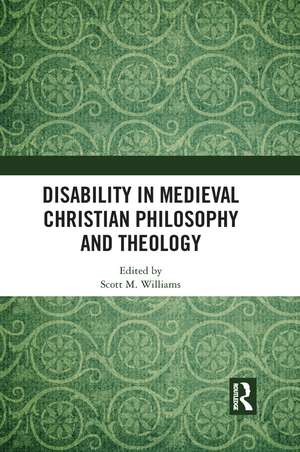Disability in Medieval Christian Philosophy and Theology
Editat de Scott M. Williamsen Limba Engleză Paperback – 13 iun 2022
The volume is divided into three parts. Part One addresses theoretical frameworks regarding disability, particularly on questions about the definition(s) of ‘disability’ and how disability relates to well-being. The chapters are then divided into two further parts in order to reflect ways that medieval philosophers and theologians theorized about disability. Part Two is on disability in this life, and Part Three is on disability in the afterlife. Taken as a whole, these chapters support two general observations. First, these philosophical theologians sometimes resist Greco-Roman ableist views by means of theological and philosophical anti-ableist arguments and counterexamples. Here we find some surprising disability-positive perspectives that are built into different accounts of a happy human life. We also find equal dignity of all human beings no matter ability or disability. Second, some of the seeds for modern and contemporary ableist views were developed in medieval Christian philosophy and theology, especially with regard to personhood and rationality, an intellectualist interpretation of the imago Dei, and the identification of human dignity with the use of reason.
This volume surveys disability across a wide range of medieval Christian writers from the time of Augustine up to Francisco Suarez. It will be of interest to scholars and graduate students working in medieval philosophy and theology, or disability studies.
| Toate formatele și edițiile | Preț | Express |
|---|---|---|
| Paperback (1) | 310.65 lei 6-8 săpt. | |
| Taylor & Francis – 13 iun 2022 | 310.65 lei 6-8 săpt. | |
| Hardback (1) | 936.03 lei 6-8 săpt. | |
| Taylor & Francis – 17 feb 2020 | 936.03 lei 6-8 săpt. |
Preț: 310.65 lei
Nou
Puncte Express: 466
Preț estimativ în valută:
59.45€ • 64.55$ • 49.94£
59.45€ • 64.55$ • 49.94£
Carte tipărită la comandă
Livrare economică 23 aprilie-07 mai
Preluare comenzi: 021 569.72.76
Specificații
ISBN-13: 9781032337005
ISBN-10: 1032337001
Pagini: 308
Ilustrații: 9
Dimensiuni: 152 x 229 x 15 mm
Greutate: 0.38 kg
Ediția:1
Editura: Taylor & Francis
Colecția Routledge
Locul publicării:Oxford, United Kingdom
ISBN-10: 1032337001
Pagini: 308
Ilustrații: 9
Dimensiuni: 152 x 229 x 15 mm
Greutate: 0.38 kg
Ediția:1
Editura: Taylor & Francis
Colecția Routledge
Locul publicării:Oxford, United Kingdom
Public țintă
Academic and PostgraduateNotă biografică
Scott M. Williams is an Assistant Professor of philosophy at the University of North Carolina Asheville. He publishes in the areas of medieval theology and philosophy, philosophy of religion, and philosophy of disability. He has published several articles in philosophical theology on the Trinity, and recently published a response article, in Faith and Philosophy, called "In Defense of a Latin Social Trinity: A Response to William Hasker." He is currently writing a book, Henry of Ghent on the Trinity, and is co-editing a forthcoming special issue of the journal TheoLogica on conciliar trinitarianism
Cuprins
Introduction
Scott M. Williams
Part I. Theoretical Frameworks
1. Plurality in Medieval Concepts of Disability
Kevin Timpe
Part II. Disability in this Life
2. Medieval Aristotelians on Congenital Disabilities and their Early Modern Critics
Gloria Frost
3. Personhood, Ethics, and Disability: A Comparison of Byzantine, Boethian, and Modern Concepts of Personhood
Scott M. Williams
4. The Imago Dei / Trinitatis and Disabled Persons: The Limitations of Intellectualism in Late Medieval Theology
John T. Slotemaker
5. Remembering ‘Mindless’ Persons: Intellectual Disability, Spanish Colonialism, and the Disappearance of a Medieval Account of Persons who Lack the Use of Reason
Miguel J. Romero
6. Deafness and Pastoral Care in the Middle Ages
Jenni Kuuliala and Reima Välimäki
7. Taking the ‘Dis’ out of Disability: Martyrs, Mothers, and Mystics in the Middle Ages
Christina Van Dyke
Part III. Disability in the Afterlife
8. Separated Souls: Disability in the Intermediate State
Mark K. Spencer
9. Disability and Resurrection
Richard Cross
10. Relative Disability and Transhuman Happiness: St. Thomas Aquinas on the Beatific Vision
Thomas M. Ward
Scott M. Williams
Part I. Theoretical Frameworks
1. Plurality in Medieval Concepts of Disability
Kevin Timpe
Part II. Disability in this Life
2. Medieval Aristotelians on Congenital Disabilities and their Early Modern Critics
Gloria Frost
3. Personhood, Ethics, and Disability: A Comparison of Byzantine, Boethian, and Modern Concepts of Personhood
Scott M. Williams
4. The Imago Dei / Trinitatis and Disabled Persons: The Limitations of Intellectualism in Late Medieval Theology
John T. Slotemaker
5. Remembering ‘Mindless’ Persons: Intellectual Disability, Spanish Colonialism, and the Disappearance of a Medieval Account of Persons who Lack the Use of Reason
Miguel J. Romero
6. Deafness and Pastoral Care in the Middle Ages
Jenni Kuuliala and Reima Välimäki
7. Taking the ‘Dis’ out of Disability: Martyrs, Mothers, and Mystics in the Middle Ages
Christina Van Dyke
Part III. Disability in the Afterlife
8. Separated Souls: Disability in the Intermediate State
Mark K. Spencer
9. Disability and Resurrection
Richard Cross
10. Relative Disability and Transhuman Happiness: St. Thomas Aquinas on the Beatific Vision
Thomas M. Ward
Descriere
This book uses the tools of analytic philosophy and close readings of medieval Christian philosophical and theological texts in order to survey what these thinkers said about disability. It surveys disability across a range of medieval Christian writers from Augustine up to Francisco Suarez.
